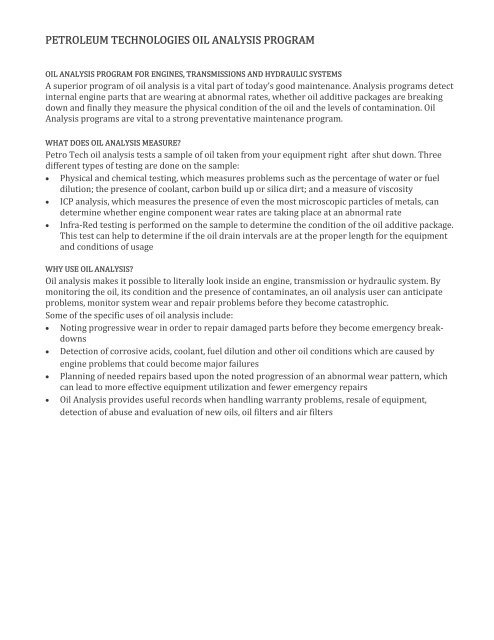Petro tech brochure rev 3-1 - Petroleum Technologies
Petro tech brochure rev 3-1 - Petroleum Technologies
Petro tech brochure rev 3-1 - Petroleum Technologies
Create successful ePaper yourself
Turn your PDF publications into a flip-book with our unique Google optimized e-Paper software.
PETROLEUM TECHNOLOGIES OIL ANALYSIS PROGRAM<br />
OIL ANALYSIS PROGRAM FOR ENGINES, TRANSMISSIONS AND HYDRAULIC SYSTEMS<br />
A superior program of oil analysis is a vital part of today’s good maintenance. Analysis programs detect<br />
internal engine parts that are wearing at abnormal rates, whether oil additive packages are breaking<br />
down and finally they measure the physical condition of the oil and the levels of contamination. Oil<br />
Analysis programs are vital to a strong p<strong>rev</strong>entative maintenance program.<br />
WHAT DOES OIL ANALYSIS MEASURE?<br />
<strong>Petro</strong> Tech oil analysis tests a sample of oil taken from your equipment right after shut down. Three<br />
different types of testing are done on the sample:<br />
• Physical and chemical testing, which measures problems such as the percentage of water or fuel<br />
dilution; the presence of coolant, carbon build up or silica dirt; and a measure of viscosity<br />
• ICP analysis, which measures the presence of even the most microscopic particles of metals, can<br />
determine whether engine component wear rates are taking place at an abnormal rate<br />
• Infra‐Red testing is performed on the sample to determine the condition of the oil additive package.<br />
This test can help to determine if the oil drain intervals are at the proper length for the equipment<br />
and conditions of usage<br />
WHY USE OIL ANALYSIS?<br />
Oil analysis makes it possible to literally look inside an engine, transmission or hydraulic system. By<br />
monitoring the oil, its condition and the presence of contaminates, an oil analysis user can anticipate<br />
problems, monitor system wear and repair problems before they become catastrophic.<br />
Some of the specific uses of oil analysis include:<br />
• Noting progressive wear in order to repair damaged parts before they become emergency break‐<br />
downs<br />
• Detection of corrosive acids, coolant, fuel dilution and other oil conditions which are caused by<br />
engine problems that could become major failures<br />
• Planning of needed repairs based upon the noted progression of an abnormal wear pattern, which<br />
can lead to more effective equipment utilization and fewer emergency repairs<br />
• Oil Analysis provides useful records when handling warranty problems, resale of equipment,<br />
detection of abuse and evaluation of new oils, oil filters and air filters


